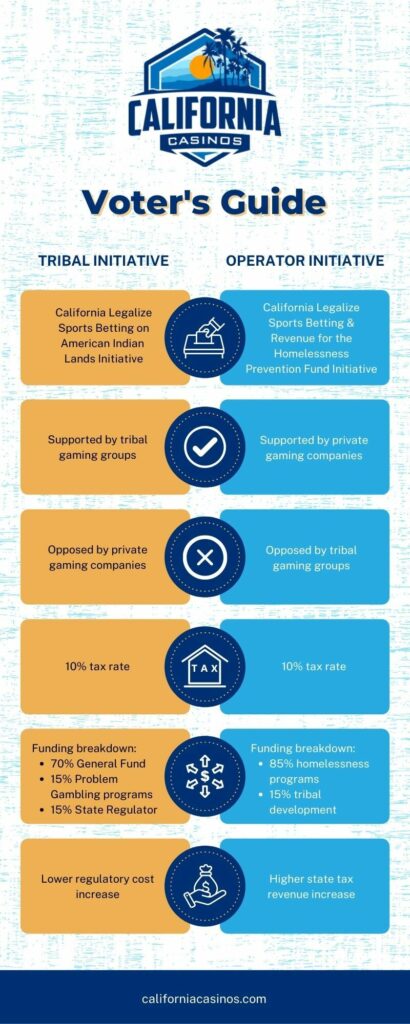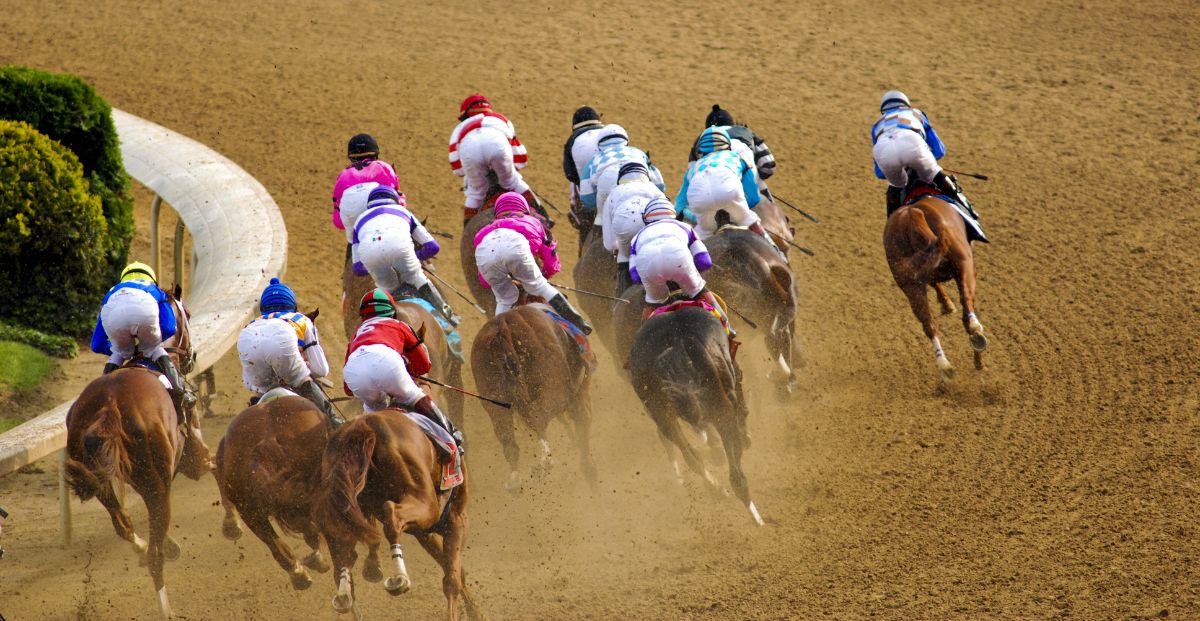The Nov. 8 California election is fast approaching, and the outlook is grim for both Prop 26 and Prop 27.
The two ballot measures that would create legal sports betting in California are both polling well below where you’d hope to have a fighting shot of getting passed around one week until the election.
But anything can happen, right?
… Right?
Prop 26 would legalize California sports betting only in-person at Indian casinos and licensed horse racetracks. It would not allow online or mobile sports betting, although some tribes are working on a ballot measure for 2024 that would allow that. If Prop 26 passes, California would generate hundreds of millions in sports betting revenue.
But the potential revenue with Prop 27 is in the billions.
Prop 27 would legalize online and mobile sports betting only, allowing the likes of FanDuel California and more to launch. Estimates for the revenue it would create range from $2.8 billion to just over $3 billion.
One important aspect of Prop 27: In order for a company to get a sports betting license in California, it would need licenses in at least 10 other states, or five states as long as it owns at least 12 casinos, and it would need to pay a $100 million licensing fee.
That’s a super quick breakdown of the two options California voters have on Nov. 8.
Want a more in-depth breakdown? Scroll down.
FULL LIST: Here Are All the Groups That Support Prop 26 and Prop 27, and Why
Latest Prop 26 and Prop 27 News
California Horse Racing Fans Get Set For 2024 Kentucky Derby
May 3, 2024Could A Retail California Sports Betting Initiative Make The 2024 Ballot?
April 5, 2024Prop 26 — In-Person Sports Betting at Indian Casinos
Prop 26 would legalize retail sports betting at California tribal casinos and the state’s four horse racetracks: Santa Anita Park, Del Mar Thoroughbred Club, Golden Gate Fields, and Los Alamitos Race Course. California bettors would have to drive to Indian casinos or racetracks to place legal sports wagers. The money from sports betting would go toward tribal communities, problem gambling programs, and California’s General Fund, which funds a wide array of programs.
Indian casinos are leaning on their history of offering gambling in California to persuade Californians to vote for Prop 26. They’re also characterizing private sportsbook companies as dangers to California’s gambling market and threats to tribal sovereignty.
Ads from Prop 26 backers claim Prop 27 wasn’t written with Californians in mind — rather that it’s a self-serving measure from sportsbook operators on the East Coast.
Prop 27 — Mobile Sports Betting From Private Companies
Prop 27 would legalize mobile and online sports betting in California.
Private sportsbook companies would secure licenses from the state and partner with tribes in the state to offer their online sportsbooks to Californians, such as DraftKings California. Sports betting revenue would fund homelessness and addiction programs in California. It would also share some revenue with non-participating tribes.
The private sports betting companies are looking for a stake in what could become the largest online sports betting market in the US, with California having the country’s largest population by far at just under 40 million residents. Prop 27 is the private sportsbooks’ attempt to secure the largest stake possible in California’s potential sports betting market.
Ads from Prop 27 backers claim their measure will help the homeless population and the non-gaming tribes that larger California gaming tribes have “left in the dust.”
What if Both Prop 26 and Prop 27 Pass?
If one ballot measure passes, it would become law in California. If both Prop 26 and Prop 27 pass, we could see a legal battle.
Here’s the deal: The California Constitution stipulates that if two ballot measures pass and they conflict in any way, the measure that got a higher percentage of votes would overrule the other measure on any conflicting provisions.
But the Prop 27 writers knew this. That’s why they specifically wrote in Prop 27 that it does not conflict with Prop 26.
“The People of the State of California find and declare the following: … Online and in-person sports betting are complementary and supplementary to each other,” it says in Prop 27. “They can be offered concurrently in California in order to maximize the amount of tax revenue generated.”
Would a judge agree? We would have to see.

The main disparity between Prop 26 and Prop 27 is that one legalizes in-person sports betting, and one legalizes online sports betting. Could those two co-exist if they both pass?
One would certainly think so. But, again, things could get technical in the courts.
Supporters of both measures have deep-seeded and very opposite interests here. California tribes want to maintain their control over the state’s gambling market, and they don’t want to lose what would amount to a huge chunk of the California sports betting market if US sportsbooks can operate in the state.
And those US sportsbooks want Prop 27 to pass for the exact same reason. In states where both are legal, online sports betting is utilized much more than in-person betting.
It’s about a 70%/30% split across the US. That would translate to a whole heck of a lot of money for private sports betting companies to make in California.
The Other Two California Sports Betting Ballot Initiatives
California’s other two sports betting initiatives failed to qualify for the 2022 ballot. One was backed by three tribal casinos. It would’ve allowed mobile sports betting controlled by the tribes. That initiative’s backers have submitted it for the 2024 ballot instead.
California’s card rooms also sponsored a CA sports betting initiative that would allow them to offer sports betting. It was similar to the operator initiative, also funding homelessness programs. It failed to qualify for California’s ballot in November.
The vast majority of California card rooms are now lined up in opposition of Prop 26.
So, November will be a showdown between the private operators and California’s tribes.
California Ballot Initiative Donors
Prop 26 and Prop 27 have both generated millions of dollars in support and opposition.
Tribal Initiative Support and Opposition
According to state filings, the tribal initiative is backed by a group called the Coalition for Safe, Responsible Gaming. Its top donors include tribes with obvious stakes in California’s gambling industry.
The Federated Indians of Graton Rancheria, for instance, have donated more than $35 million in support of Prop 26; that tribe runs Graton Resort & Casino, a 534,000-square foot casino resort 9 miles south of Santa Rosa that is the fifth-largest casino in California. The Pechanga Band of Indians, who owns Pechanga Resort Casino in Temecula, has donated north of $30 million.
Overall, the coalition had donated about $120.7 million in support of Prop 26, per the California Secretary of State’s database, as of Nov. 8. The most recent two contributions, on Oct. 25, totaled $3,018.22 from the Barona Band of Mission Indians, which owns Barona Resort & Casino just outside San Diego.
As of November 2022, 58 tribes have endorsed Prop 26: 29 gaming tribes, 15 limited-gaming tribes, and 14 non-gaming tribes (although seven of those 14 are currently building or planning to build casinos).
The opposition is largely made up of a committee called the Taxpayers Against Special Interest Monopolies. The California Commerce Club (which owns Commerce Casino, one of California’s top card rooms) and several private card rooms and gambling companies, including Hawaiian Gardens Casino, comprise this committee. Gambling Company, PT Gaming LLC, made its own committee, No on the Gambling Power Grab, to oppose the tribal initiative.
Together, these committees had donated about $43.8 million to oppose the tribal initiative as of Nov. 8. So far, the top donors in opposition to Prop 26 are the California Commerce Club and Hawaiian Gardens Casino, at just over $10.3 million apiece.
The most recent contributions came on Oct. 27 — $100,000 from Elevation Entertainment Group and affiliated entities, which own three California card rooms, and $300,000 from F2 TPS, LLC, a third-party card room services provider.
There is a provision in Prop 26 that would allow tribes to directly sue card rooms if they feel like laws are being violated — and they do think laws are being violated with the ways card rooms offer blackjack.
Prop 26 could also hurt card rooms by providing another in-person gambling option — one that would be widely popular, and unavailable at card rooms. As a result, California card rooms oppose Prop 26.
Operator Initiative Support and Opposition
As of Nov. 8, the mobile sportsbook initiative had raised just over $169.2 million in support from a group called Californians for Solutions to Homelessness and Mental Health Support. This group is made up of some of the largest gambling companies in the US, including:
- BetMGM LLC
- Betfair Interactive US LLC (FanDuel)
- Crown Gaming, Inc. (DraftKings)
- Bally’s Interactive LLC
- FBG Enterprises LLC (Fanatics, Inc.)
- Penn National Gaming, Inc. (PENN Gaming/Barstool)
- WSI US LLC (WynnBET)
The top donor in support of Prop 27 has been FanDuel, which has donated over $35 million. DraftKings has donated more than $34 million. BetMGM, PENN Gaming, and Fanatics have contributed $25 million apiece. Bally Bet and WynnBET have each donated $12.5 million.
The most recent contribution was $93,779.00 from DraftKings on Nov. 6. Until a series of small donations from Oct. 27-Nov. 6, a sportsbook hadn’t donated any money since Oct. 1.
Three California tribes — the Big Valley Band of Pomo Indians, Middletown Rancheria of Pomo Indians, and Santa Rosa Rancheria Tachi Yokut Tribe— publicly support Prop 27. The Santa Rosa Rancheria Tachi Yokut Tribe owns Tachi Palace Casino Resort, the seventh-largest casino in Northern California. The other two tribes are considered limited-gaming tribes, which means they own casinos with 35o or fewer slot machines.
“Prop. 27 will provide us with economic opportunity to fortify our Tribe’s future for generations and protect Tribal sovereignty,” said Leo Sisco, Chairman of the Santa Rosa Rancheria Tachi Yokut Tribe, in a press release. “And it is the only measure that will deliver hundreds of millions of dollars each year to help solve homelessness and address mental health in California.”
Donors had raised about $117.1 million in opposition of Prop 27 as of Nov. 8. The Californians for Tribal Sovereignty and Safe Gaming makes up the bulk of the No on 27 group. The San Manuel Band of Mission Indians, which owns Yaamava’ Resort & Casino, CA’s largest casino, has donated north of $103 million in opposition of Prop 27.
The most recent contributions in opposition of Prop 27 came Nov. 1 from the Paskenta Band of Nomlaki Indians — $100,000.
Major state education organizations, including the California Teachers Association and California Federation of Teachers, oppose Prop 27. California’s top Democrat and Republican lawmakers have also announced their opposition to Prop 27.
Prop 26 and Prop 27 Campaign Spending
Spending on Prop 26 and Prop 27 continues to shatter records.
As of Nov. 8, donors had contributed more than $450.7 million to both campaigns, further establishing this California sports betting debate as the most expensive California ballot measure battle ever.
What the Initiatives Do for Bettors
The sports betting initiatives do two things for bettors: Offer different sports betting frameworks and direct funding to different programs.
Prop 26 — Tribal Initiative
The tribal initiative would allow in-person betting at tribal casinos and California horse racetracks. Sports betting legislation often leaves out horse racetracks, but their inclusion allows the proposition’s fiscal note to read positive. Card rooms would be taxed while each tribe would negotiate revenue-sharing deals individually.
The tribal initiative would set a 10% tax rate on sports betting revenue. After 40% goes toward public K-12 schools and community colleges, that money would be disbursed as follows:
- 15% to problem gambling programs
- 15% to the state regulator to enforce industry rules
- 70% to California’s General Fund
Its fiscal note estimates that state tax revenue could increase by the “mid-tens of millions.” Additionally, state regulatory and enforcement costs could increase by the “low tens of millions annually.” So, its fiscal note projects a smaller increase in regulatory costs than the operator initiative.
Prop 27 — Operator Initiative
The operator initiative would allow online sports betting to be offered through private gambling companies. Private companies would partner with California’s tribes to offer mobile sports betting across the state. So, bettors wouldn’t have to travel to a tribal casino to place sports wagers.
The operator initiative would tax sports betting revenue at 10%. After covering regulatory costs, those funds would be allocated as follows:
- 85% to homelessness programs
- 15% to nonparticipating tribes
Its fiscal note estimates that state tax revenue could reach the “mid-hundreds of millions of dollars annually.” In contrast, new regulatory costs could increase by “mid-tens of millions.” So, the operator initiative projects a larger increase in new tax revenue than the tribal initiative. Prop 27 is the only option that specifically will mandate funding for homelessness programs. However, the General Fund, to which Prop 26 sends 70% of revenue tax, funds a wide array of programs, including some for homelessness.
An August 2022 report published by Eilers & Krejcik Gaming, an independent research and consulting firm, predicted Prop 27, if passes, would generate $2.8 billionin annual California online sports betting revenue. So, let’s do some math.
- The Prop 27 tax rate is 10%, so that would mean $280 million in sports betting revenue tax funds.
- Under Prop 27, 85% of tax funds would go toward homelessness programs and 15% would go toward non-gaming and limited gaming tribes. So, that would be $238 million and $42 million, respectively.
- As of November 2021, there were 72 non-gaming and limited-gaming tribes eligible for annual Revenue Sharing Trust Fund payments of $1.1 million. So, that extra $42 million from Prop 27 would equal an extra $583,333.33 per tribe.
That same report said DraftKings, BetMGM, and FanDuel would likely own at least 70% of the California sports betting market in the early stages if Prop 27 passes.
How Do California Sports Bettors Feel About Prop 26 and Prop 27?
California Casinos conducted a survey in August 2022 of 600 Californians 18 and older who either currently bet on sports in some way (including using offshore sites) or are interested in betting on those sports.
Of those 600 respondents, 61% said they want both Prop 26 and Prop 27 to pass; 60% said they’d prefer private companies like DraftKings and FanDuel run California sportsbooks, not tribes; 57% think it’s very important to use a legal sportsbook; and 49% prefer the Prop 27 model for using revenue state tax funds, compared to 32% for Prop 26.
Another interesting result from the survey: 62% said they’re already betting on sports. That tells us three things.
First, many Californians still don’t know what sports betting actually entails, because some of the answers provided to a question about which sportsbooks they used did not make sense (e.g. Google, Amazon, NFL, etc).
Second, we know for a fact many California sports bettors are using illegal offshore sites because many listed them (e.g. Bovada, BetUS, etc.).
Third, this also likely means many Californians are using VPNs to illegally access other states’ sportsbook platforms.
What Are the Chances of Prop 26 or Prop 27 Passing?
Very, very slim.
The most recent polling, from a late-October survey by the Public Policy Institute of California, paints a grim picture for both Prop 26 and Prop 27. Of the 1,111 likely California voter respondents, only 34% said they planned to vote yes on Prop 26 and just 26% said they planned to vote yes on Prop 27.
In that survey, 48% of likely California voters also said legalizing sports betting would be a “bad thing” for the state. Prop 26 could possibly pass with a miracle; 9% were undecided, meaning if the campaign can sway all undecideds before Nov. 8, it would get to 42% … and the poll had a 5.1% margin of error. That’s close to 50%.
Prop 27, however, appears doomed. In a September poll by PPIC, 51% of adults ages 18-44 supported Prop 27. In the October poll, that support dropped to 41% — meaning no demographic group has majority support for the California online sports betting ballot initiative.
A poll from SurveyUSA in early October paints a slightly different, brighter picture for both props. In that poll, 43% of likely California voters supported Prop 26 and 37% supported Prop 27.
California Sports Betting Initiative Summary
On Nov. 8, 2022, Californians will have two sports betting initiatives on their ballot.
Prop 26 would allow sports betting only in-person at tribal casinos and California’s four horse racetracks. This measure, favored by most California tribes, would spread tax funds around to problem gambling programs, sports betting policy enforcement, and the General Fund. Prop 26’s fiscal note estimates a smaller increase in regulatory cost than the operator initiative. The tribal initiative’s full name is the California Legalize Sports Betting on American Indian Lands Initiative.
The operator initiative, Prop 27, would allow private sportsbook companies to offer mobile sports betting through partnerships with California’s tribes. This initiative would fund homelessness programs and tribal development. Its fiscal note estimates a larger increase in state tax revenue than Prop 26. Its full name is the California Legalize Sports Betting and Revenue for Homelessness Prevention Fund Initiative.

